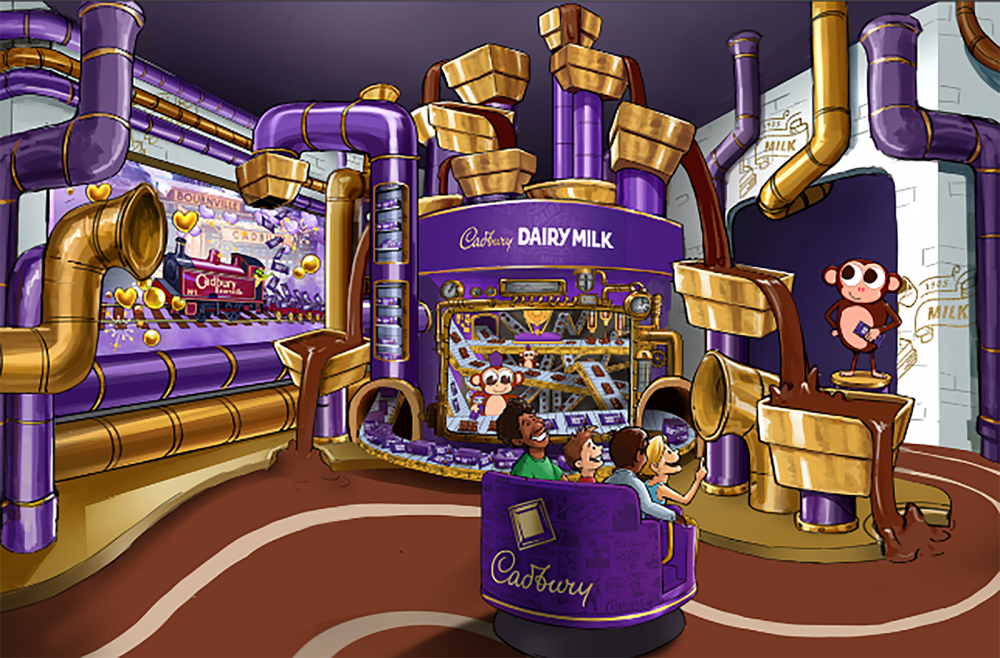REVIEW: Descent – a dark metaphysical journey towards light
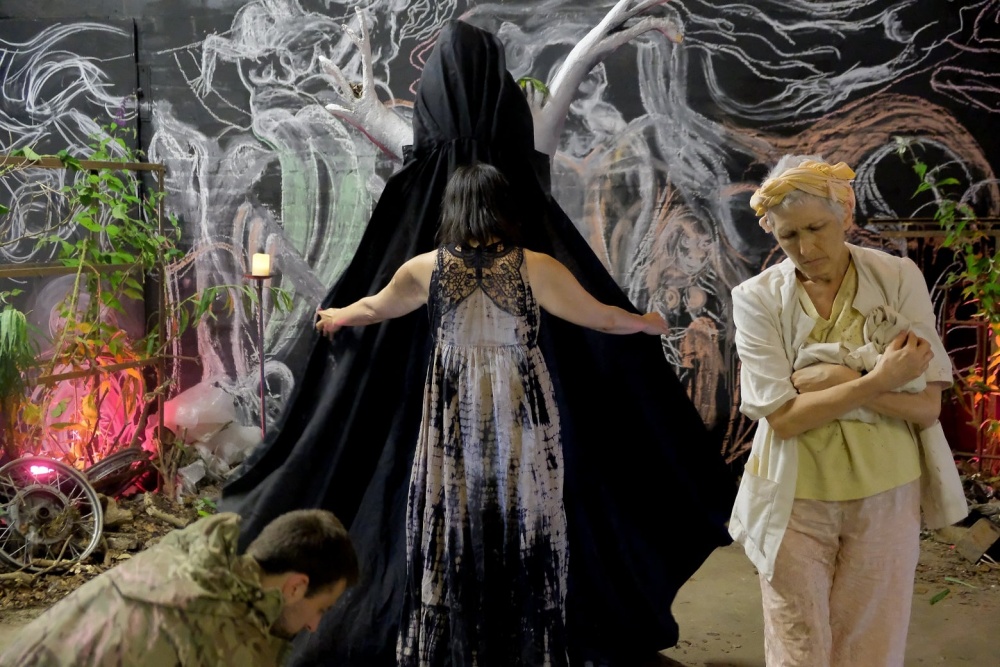
Midland Actors Theatre and Purbanat Theatre premiered a philosophical new work in the Jewellery Quarter which explored humanity’s descent into the dark abyss after an apocalyptic war wipes out most of the human race.
‘Descent’ is a stark and daring new drama which takes the audience on a unique theatrical journey from the darkness of despair to the light of redemption and rebirth.
David Allen, artistic director of Midland Actors Theatre, brought a dynamic and exciting new show to an unexpected location in Birmingham. The setting he chose for the intimate and haunting production of ‘Descent’ was The Lampworks, a former disused and derelict factory in the Jewellery Quarter. This new drama, which combined drama and dance, stirred the senses and ignited the imagination with themes of war, grief, loss and guilt.
The theme of rebirth resonated powerfully in the location where the drama was performed. The once derelict factory has been renovated and given a new lease of life with a new purpose. This motif of regeneration mirrors the broken and haunted characters who inhabit the world of ‘Descent’. Each damaged individual will find rebirth and a new purpose at the close of the drama.
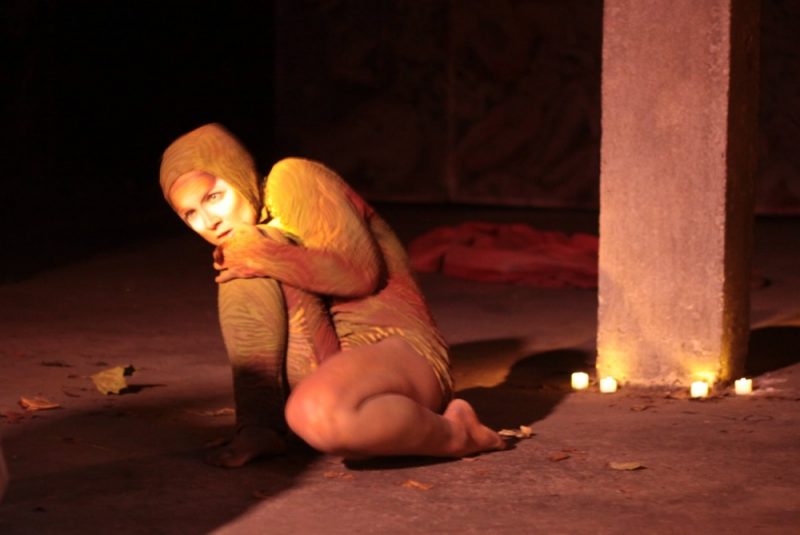 Jack Barnes
Jack Barnes ‘Descent’ is a refreshing theatrical experience which breaks away from conventions and rules associated with a night out at the theatre. There’s no seating, no red carpet, no ushers, and no distance between performers and audience.
The concept employed by Midlands Actors Theatre, which is based in Birmingham, seems to take a feather from the style used by the late Graham Vick for Birmingham Opera Company productions.
The experience for those who attended the performance of ‘Descent’ was one of being immersed in the action and feeling the raw emotions of the characters who performed only a few feet away from the audience.
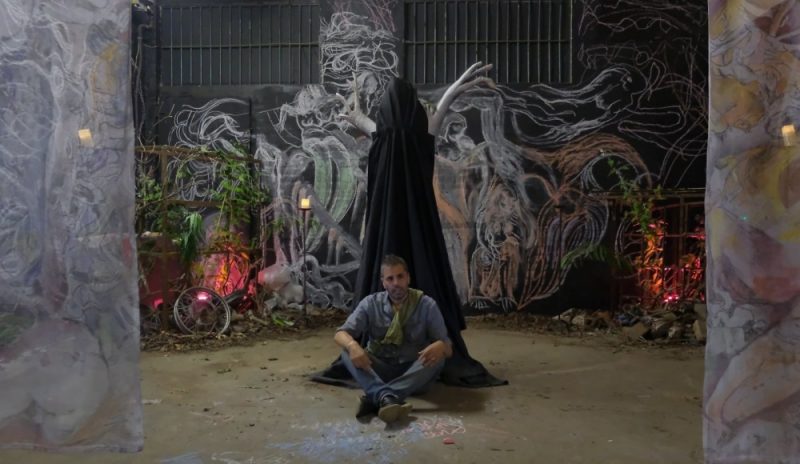 Midland Actors Theatre
Midland Actors Theatre ‘Descent’, written by David Calcutt and Sarah Sayeed, follows the nightmarish story of a handful of fractured and traumatised characters who are all trying to find purpose and meaning in a post-apocalyptic world which has been decimated by the obscene horror of war and pain.
The barbarism of man’s violence towards fellow human beings has ravaged everything and nothing has been spared. Nature itself has been violated and scorched, only stumps of trees and decaying leaves remain in a haunted and infernal landscape.
The sacred has been made profane, life has been twisted into death, and spirituality has been bled out of existence.
The pain of guilt and paranoia haunts and plagues the characters in the drama, the psychological horror eats away at them from inside, day and night, without pause or relief.
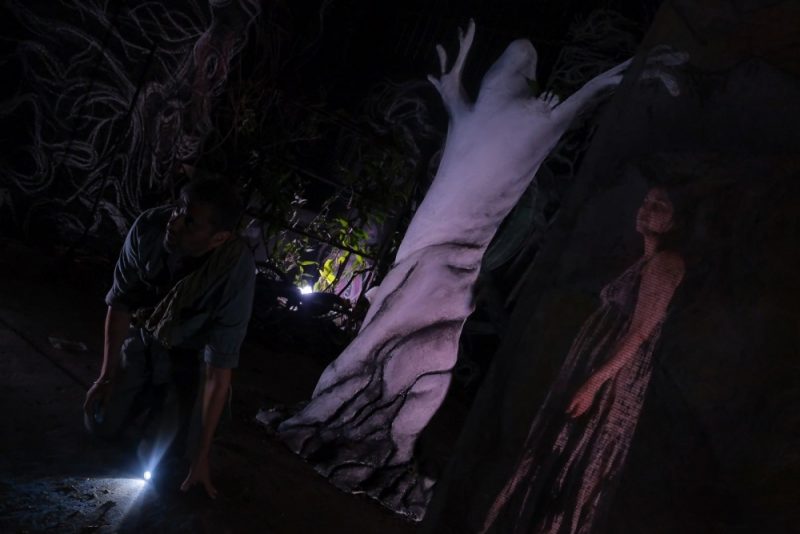 Midland Actors Theatre
Midland Actors TheatreThe drama unfolds unexpectedly as the audience gathers and mingles in the courtyard of The Lampworks. A homeless man wanders in off the street in a disorientated state, mumbling under his breath and jabbing at the sky with his fingers, he fishes out a chalk from his pocket and starts to scrawl on a wall.
Suddenly, the raggedy and vulnerable man becomes agitated, he clambers up the rusted metal fire escape, the audience nervously moving out of the way in surprise and alarm. Once he’s perched high up on the stairs of the fire escape the man shouts out a few lines in a voice filled with pain and anguish: “Once upon a time…”
This is Ishmael.
He will share his story, alongside the other characters who will be introduced later, and he will also act as a guide during the exciting show.
Ishmael instructs the audience to pick up the lanterns which are laid out in rows alongside the wall and follow him into an underworld that is dreamlike yet raw and real. The journey upon which he will guide the audience is a descent into the abyss and beyond, a metaphysical journey similar in tone to that described by Dante and Ibn Arabi.
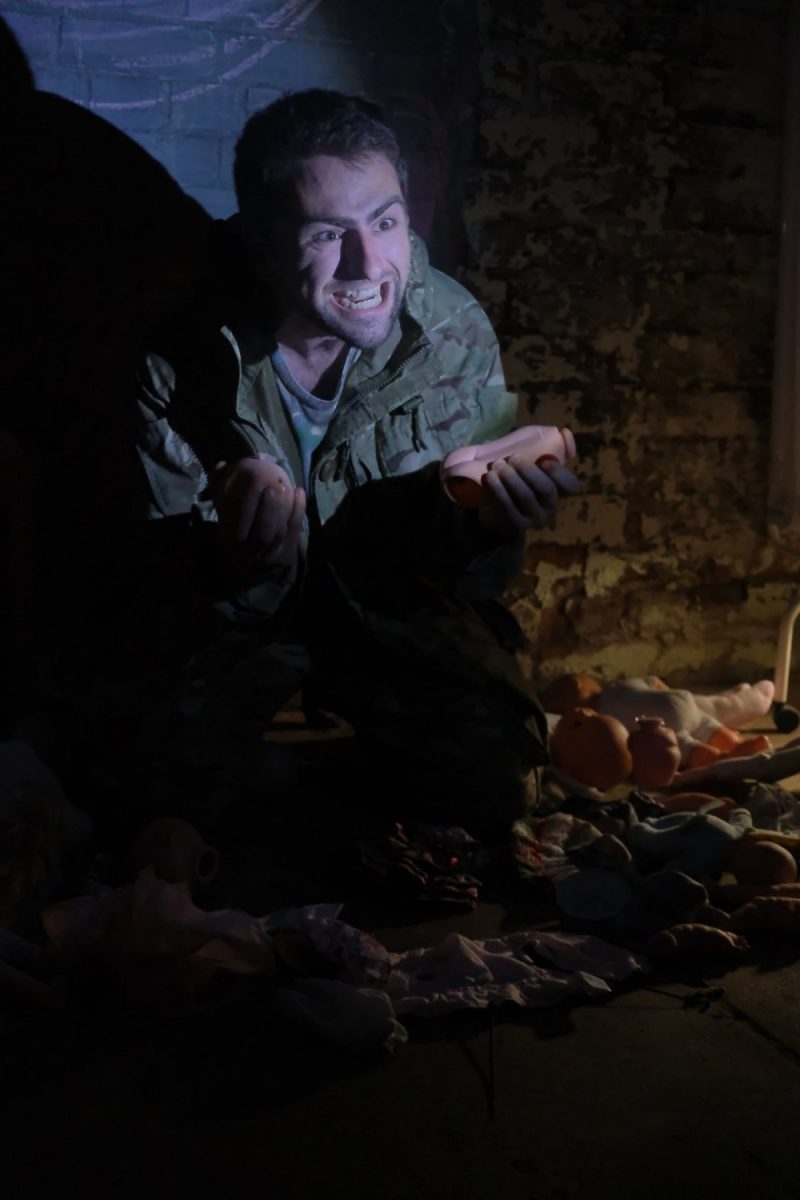 Midland Actors Theatre
Midland Actors Theatre The descent into the underworld, or into another realm of the senses, is something that has been with mankind throughout the ages and across cultures. Dante shows the soul embarking into the afterlife and witnessing the different levels upon the journey, from the infernal damnation of Hell through to Purgatory and finally finding solace and redemption in Heaven.
Likewise, the Sufi philosopher Ibn Arabi wrote about a similar cosmic concept called marâtib which signifies a mystical journey. This inward journey explores the landscape of the human heart and mind, delving deep into the soul. Ibn Arabi described this journey of discovery as a trek through the realm of barzakh, a spiritual place that can be unlocked via the imagination.
This lyrical idea of a world-within-a-world was brought to the fore as Ishmael led the audience into the bowels of the old building. The descent into the underworld took on a poignant significance with the knowledge that the tragic drama was unfolding only a stone’s throw from Key Hill Cemetery in the Jewellery Quarter.
This haunting reminder was brought to the fore when one of the show’s character’s, named Inanna, suddenly emerges from the direction of the graveyard, wearing a thin garment stained with dust and earth, and walking barefoot as she made her way through the audience and into the performance space.
The audience will later discover this corpse-like woman to be a victim of war who endured terrible abuse. Through her broken sobs she howls out her nightmare of rape at the hands of ‘faceless’ men.
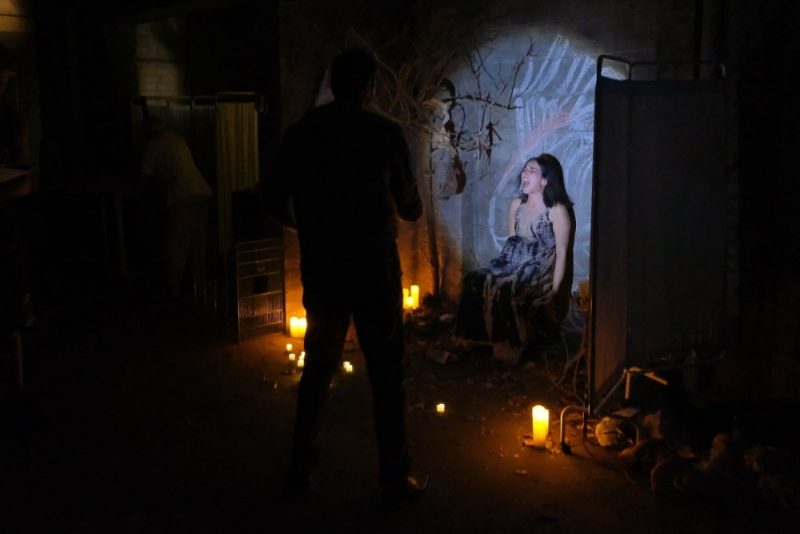 Midland Actors Theatre
Midland Actors Theatre This aspect of war – rape as an horrific weapon – is something that visited our world in recent times during the Balkans war when Serbian forces rounded up Muslim women, including girls who were under 10-years-old, and imprisoned them in a ‘rape camp’. The depravity suffered by these poor victims is beyond description. Inanna’s ordeal in ‘Descent’ makes the audience realize the horrific weight of the trauma a rape survivor has to carry on a daily basis.
The show descends into a bunker of pain, a place in the subterranean abyss of the human mind where nightmares refuse to leave. Ishmael sinks lower and lower into the dark space of the old factory and the audience hush as the very walls seem to pulsate with pain.
The atmospheric lighting weaves patterns across the gauze curtains, which act as ‘walls’ between the hovels inhabited by the characters, the space becomes increasingly claustrophobic and seems to close in on the audience as the world outside is left behind and recedes.
These characters inside this dark and desperate place are each frozen in their lives, each person dealing with a personal tragedy that led them to this neolithic cave which is etched with chalk drawings which depict a carnival of suffering in jagged lines.
‘Descent’ allows each character in the drama to vocalise the pain buried inside them, each protagonist is given a moment to reflect upon what led them to embarking upon a journey into the apocalyptic abyss.
Attar, a young soldier, recalls the moment he mistakenly shot a mother and her child, and now he runs around the streets screaming in anguish with a rifle slung over his shoulder. A child’s doll dangles from the pocket of his army fatigues, a reminder of his guilt.
Rachel, a doctor who euthanised a child, now feels a deep pain in her womb which refuses to budge despite daily injections to numb the pain and despair. Rather than alleviating her pain the injections have led to addiction which fuels her paranoia as the world darkens around her. Her deep-rooted guilt drowns out all hope of recovery.
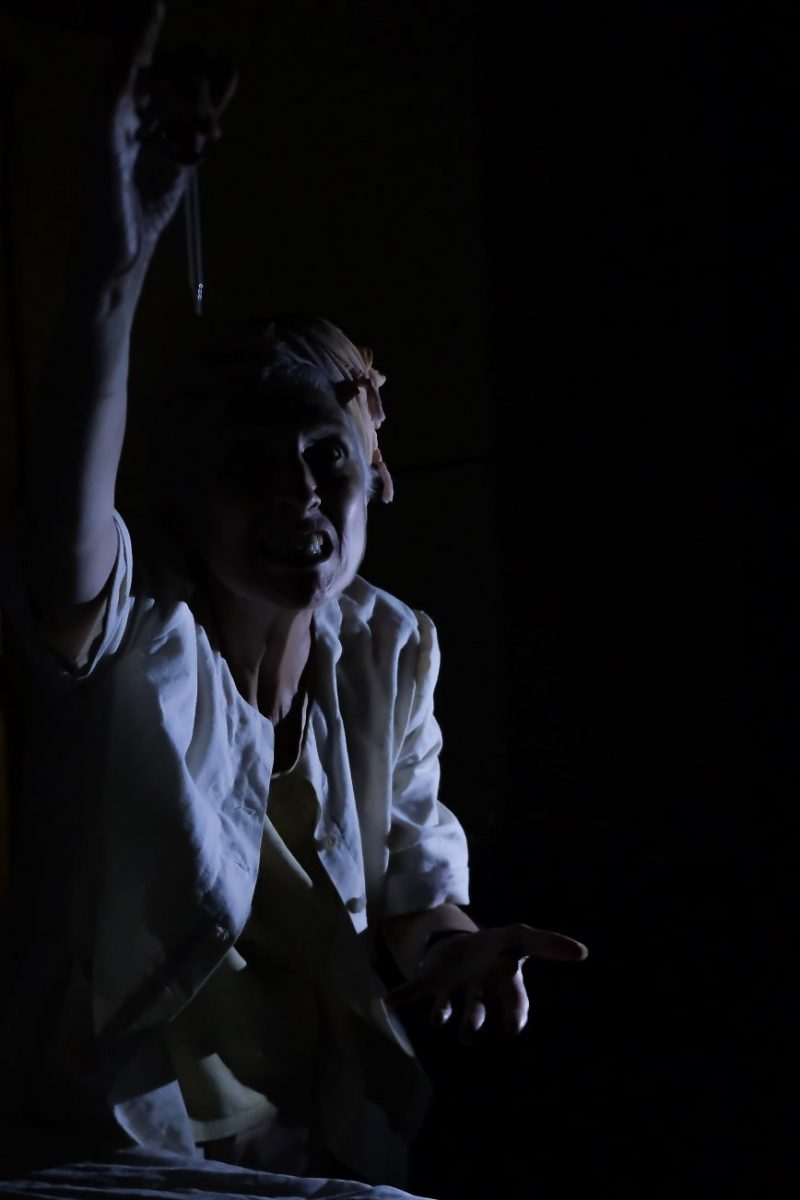 Midland Actors Theatre
Midland Actors Theatre As these poor and ragged people unsuccessfully try to patch up their broken lives, and the world further descends into the darkness of chaos and alienation, there is a chance of hope from a source from deep within the belly of the earth beneath their feet.
The trunk of the tree at the centre of the drama resembles a human torso with broken branches that look like arms reaching out towards the sky in silent supplication. From the foot of the dead tree, and seemingly infertile earth, a shadow rises up, a shape shrouded in a dark and foreboding cloak, the energy of the Grim Reaper seems to radiate from this terrifying apparition.
However, the eyes of the audience and the characters are deceived by their lack of understanding due to what they have been led to believe in a world where lies are paraded about as the truth. Fake news and sensationalist headlines have tarred whole nations and races, and in time these stereotypes lead to mistrust and warfare. However, once there is true understanding and prejudice has been removed, the truth emerges.
As the shadowy figure rises and towers up it begins to twist and contort, dancing in a primordial and feral manner. The sheet swirls and the audience sees fleeting glimpses of a feminine form beneath the cloak.
This is the spirit of the earth, the convulsing movements of the goddess responding to man’s tyrannical abuse of the world.
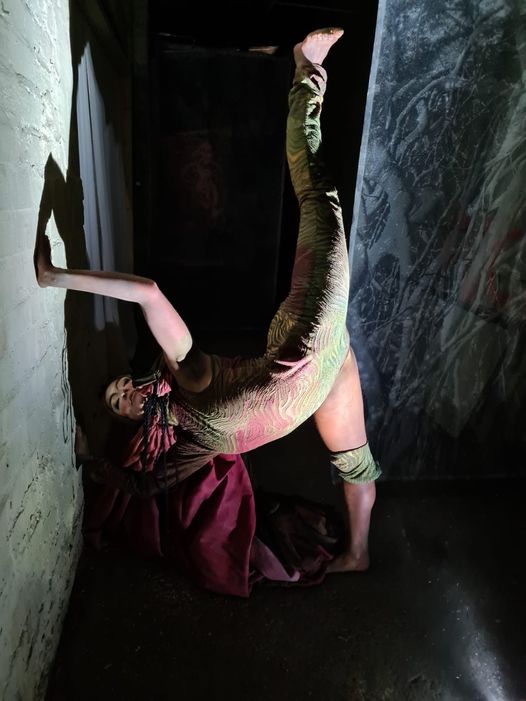 Rachel Barnes
Rachel Barnes The dancers who bring to life the spirit of the earth goddess are astounding. Sara Macqueen and Harriet Ellis are both electrifying, their movements are sourced from a deep place, from tribal contortions to sublime and sensual forms that bring calm and healing to the tormented characters who inhabit the nightmarish landscape of ‘Descent’.
The doctor nursing the infernal pain of guilt finds ease at long last. A soldier suffering from post-traumatic stress disorder finally walks with peace. The woman who silently endured sexual crimes against her body and mind finds the strength to breathe freely again. A poet who lost his muse and stories is once again inspired to find new tales to tell from the fragments of voices he has heard.
Each performer in ‘Descent’ deserves a special mention for such a raw and exhilarating night at the theatre. Vimal Korpal is mesmerising as Ishmael, the poet in search of his voice and words. He holds the attention of the audience in every scene, all ears lingering on his impassioned narration and monologues.
This is a man whose life takes on a fresh meaning at the close of the drama and Korpal reaches deep into his own soul to project the intense emotions coursing though his heart and mind.
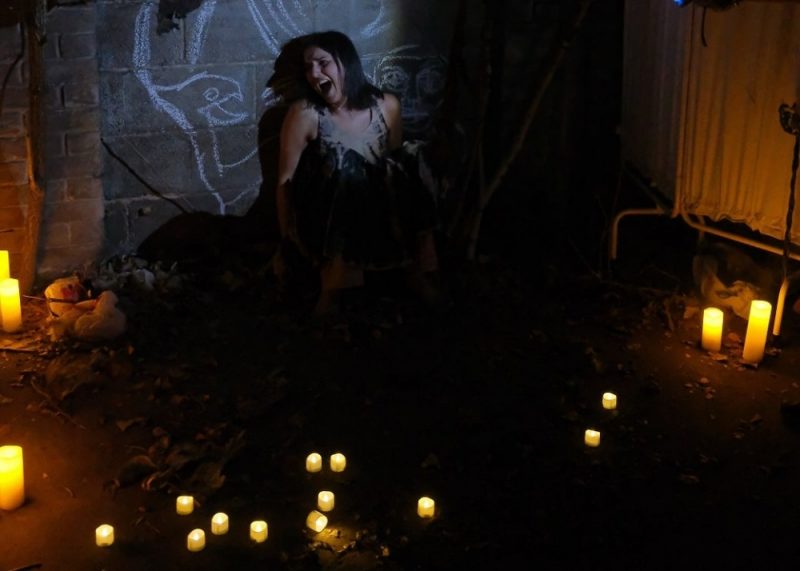 Midland Actors Theatre
Midland Actors Theatre Dominic Thompson invests the character of Attar with militaristic precision that has gone awry, a man dealing with mental breakdown, his eyes lit with a ferocious fire, unable to sleep or eat. Thompson added little details to his performance which brought a psychological realism to the character. Whilst holed up in the bunker, and surrounded by an array of broken plastic dolls, his hands cradled the baby dolls as he remembered the horrific blunder he made whilst out on patrol which led to the slaughter of an innocent woman and child. Thompson’s performance is beautifully nuanced and he makes the audience feel pity for him despite the horrendous crime he has committed.
Alex Kapila, as the rape victim Inanna who walks across the landscape as ‘priestess’ of the scorched woodlands, showed immense courage and strength throughout the show. Despite the shocking things her character has seen and suffered at the hands of the men of war and violence she finds a new purpose in life. She becomes the priestess whose actions will lead towards healing and rebirth. Although small and waif-like, she becomes the Ophelia of ‘Descent’. The fire inside her can never be extinguished. Not even death will silence her spirit. Kapila makes the audience feel her power through her vocal delivery, which echoes off the walls of the old building, and her graceful balletic movements mirror her inner landscape.
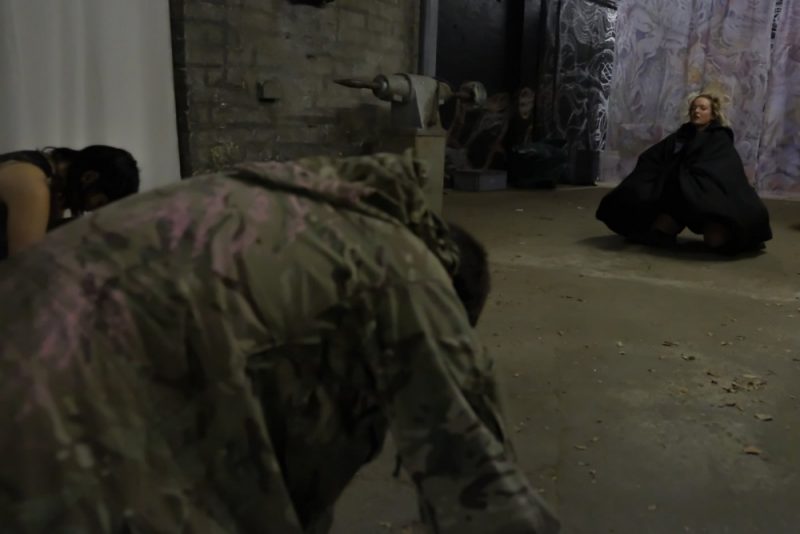 Midland Actors Theatre
Midland Actors Theatre Caroline Burns Cooke, who took on the difficult role of Rachel – who euthanised a child – lit up her performance with honesty and a raw openness. Her video diary extract becomes a poignant confession which is both intimate and heartbreakingly poignant in its realism. Every word that she utters is painted with pain.
The searing choreography by Helen Calcutt, who also directed the movement in this site-specific production, is incredibly emotional and perfectly synchronised to convey the unspoken elements that surge inside each character in the drama. ‘Descent’ dispenses with reams and reams of dialogue and instead opts to use dance as a means of vocalising the narrative as the action moves towards a poignant climax. Calcutt’s organic choreography, and direction of movement, becomes visual vocabulary for the actors and dancers in several pivotal scenes. Arms, legs, torsos, even eyes and facial expressions become essential components as the spirits of the earth inspire each tortured character towards light and healing.
Despite the deeply disturbing themes explored in ‘Descent’, and the sense of foreboding and constant paranoia, the show leaves the audience energised and positive at the climax.
In a short running time, clocking in at an hour, the drama packs in mature themes that continue to haunt the human race. The pacing is delicately balanced which allows the various elements of the drama to unfold in a natural rhythm which is in tune with the soul of the show.
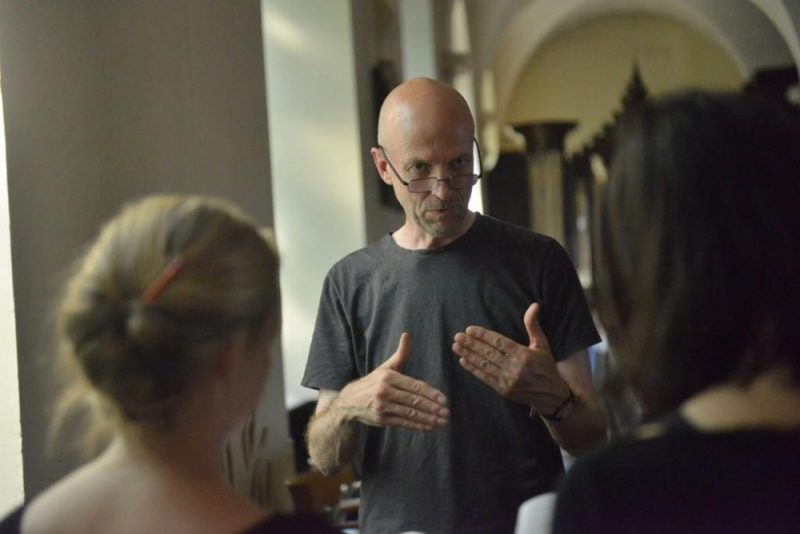 Midland Actors Theatre
Midland Actors Theatre One of the key motifs throughout ‘Descent’ is the ‘soul’ of the Tree of Life which has been reduced to a trunk. The scarred and lifeless tree, positioned almost like an altar in a shrine shows the signs of rebirth as new leaves sprout on the once barren branches at the climax of the show. That symbolism of a new dawn is also reflected in each character. The darkness and the violence evaporate as the light of mercy and love shimmers across the landscape.
Spirituality returns to the world.
No matter how dark the world becomes, no matter how much evil pollutes the landscape, there will always be the light of hope and love which will restore the balance. The spirits of the earth will dance to the melody of life. The new dawn will usher in rebirth and new roots will be established, new trees and flowers will grow, and children will sing new songs and write new poems.
The cycle of existence and cosmic energy will flow on.
This ‘Descent’ into the abyss proved to be a metaphysical journey towards light and hope.
























